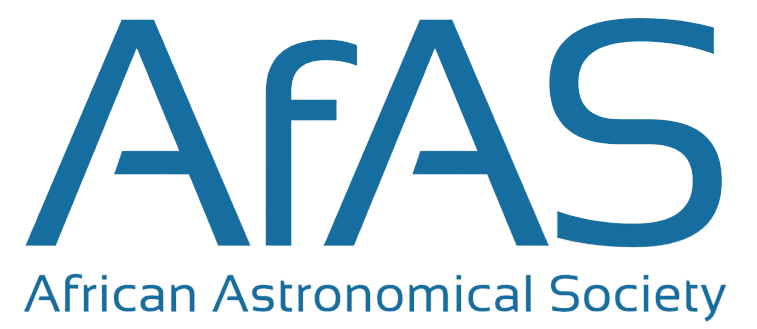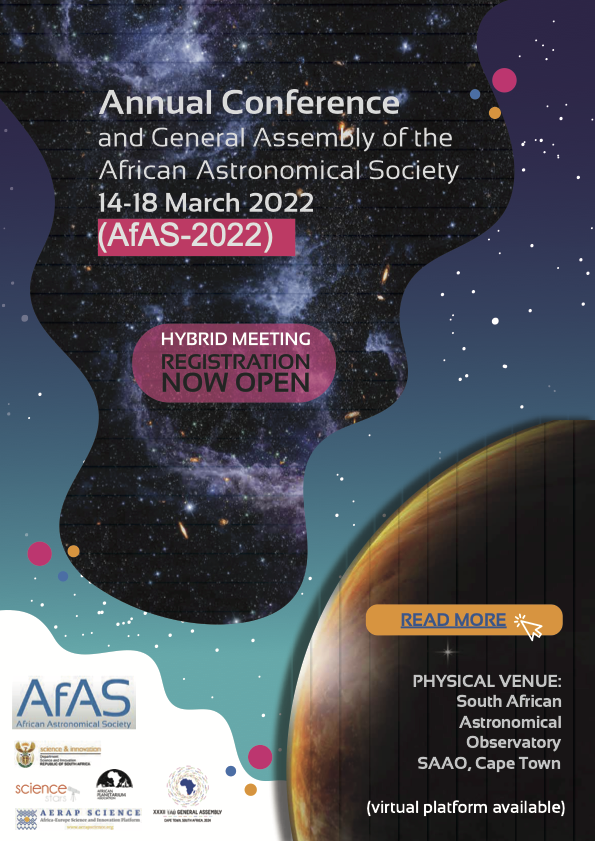Abstract submission deadline extended to 20 January 2021
Click here to Register Now!
BACKGROUND AND MOTIVATION
The Annual AfAS conference: AfAS2022
In line with the objectives of AfAS and its science strategy, the society plans to hold its second annual conference from 14-18 March 2022. The conference will focus on the science, outreach, communication, and education activities emanating from Astronomy in Africa and will seek to further enhance collaboration among countries in Africa as well as the rest of the world. It will also focus on the status of astronomy infrastructure, AfAS led flagship projects, astronomy for development, and initiatives aimed at attracting and retaining youth in astronomy and strengthening existing activities in the field. The conference will be organised with the involvement of all the AfAS committees and partner projects (the African Planetarium Association (APA), the African Science Stars Publication (ASSAP), and the African-European Radio Astronomy Platform (AERAP).
The General Assembly: AfAS-GA2022
The AfAS2021 General Business meeting acknowledged the good progress made by AfAS since the Astronomy in Africa meeting held in Cape Town, South Africa, at the South Africa Astronomical Observatory, from 25 to 26 March 2019. The meeting also took note of the status of the various committees and there were calls for further inputs and topics of interest from the community. Following the AfAS Constitution, a General Assembly must be convened every three years, the next such event is due in March 2022, and this will be held immediately after the annual conference. The term of office of the current Executive Committee end on 31 March 2022, a new Executive Committee will therefore be elected at the General Assembly. The Membership Committee will use the General Assembly to provide an update of the membership status of the Society and present draft plans for the introduction of member benefits and membership fees from April 2023. Proposed changes to the Constitution will also be tabled for discussion and approval by the General Assembly.
OBJECTIVES
- Share astronomy research from across Africa and promote discussions on research topics for the future.
- Foster collaborations within the African Astronomy Community and the rest of the world
- Showcase recent developments in Astronomy in African countries.
- Provide a platform for policymakers, funders, researchers, outreach officers, and educators to present and discuss the most recent innovations, trends, and concerns as well as practical challenges encountered, and solutions adopted.
- Discuss continental, regional, and national plans including flagship projects and the idea of astronomy hubs leading up to the IAU General Assembly in 2024, and the envisaged legacy thereafter.
- Elect a new Executive Committee and approve the proposed constitutional changes
- Discuss and accept membership fees and benefits, and its introduction from April 2023
EXPECTED OUTCOMES
- New partnerships and collaborations in the fields of astronomy and related big data research in Africa and internationally
- Increased Awareness of activities in Africa both by Africans and international collaborators
- Increase in collaborations and better dialogue amongst countries
- Acceptance of the AfAS flagship projects and associated implementation strategies and action plans.
- Inspired Young Africans to take ownership and drive the development of astronomy in Africa
- Identification of strategic partnerships for the implementation of AfAS projects for the development of Astronomy in Africa towards the GA2024 and beyond
- Free and fair election of an Executive Committee that will continue to build on the work of the outgoing leadership.
- Approval of proposed constitutional changes
- Approval in principle, of membership fees and benefits
DATES
14 – 18 March 2022
FORMAT
The conference will be hybrid (online and physical), with the in-person venue being the South African Astronomical Observatory (SAAO) in Cape Town, South Africa. This is the same venue where AfAS was officially relaunched in March 2019. The proposed format for the conference is listed below:
Day 1:
(i) Short address by special guests who represent the major stakeholders of AfAS 3 keynote talks on major topics/flagship projects
(ii) Science, Education, Development, and Outreach plenary talks
Day 2: Science, Education, Development, and Outreach
– Special Session 1
Day 3: Science, Education, Development, and Outreach
– Special Session 2
Day 4: Science, Education, Development, and Outreach
– Special Session 3
Day 5: AfAS2022-General Assembly
The keynote plenary talks will take place in the mornings, followed by parallel sessions which are more thematic. The Science, Education, Development, and Outreach sessions will include a variety of primarily invited talks and contributed posters. Interactive networking sessions, including the Hackathon, will promote discussions, stimulate conversations.
VENUE
The in-person venue will be the South African Astronomical Observatory (SAAO) which will also serve as the host for the Control Centre for the virtual platform. Information on the virtual platform will be made available closer to the conference.
ORGANISING COMMITTEES
Local Organising Committee (LOC)
The LOC will be responsible for the general planning and organisation of the annual conference and General Assembly. It will be responsible for the programme for the annual conference as well as the agenda for the General Assembly. Members of the LOC are members of the AfAS EC as well as members of the AfAS Committees. Members of the LOC are listed below:
- Charles Takalana (Chair) – AfAS
- Yunus Manjoo (Co-chair) – AfAS
- Mutshidzi Nelawamondo (AfAS)
- Lutendo Ramadwa (APA)
- Duduzile Kubheka (SAAO)
- Nazli Mohamed (SAAO)
- Tebogo Mashile (DSI)
Scientific & Outreach/Education Organising Committee
This Committee is to be co-chaired by the Chairs of the Science and Outreach & Education Committees of AfAS and will be responsible for selecting the talks and posters for both the Scientific and Outreach/Education programmes.
- Co-Chair: Mirjana Pović (Science)
- Jamal Mimouni (Science and EDO)
- James Chibueze (Science)
- Geoff Beck (Science)
- Edward Jurua (Science)
- Brenda Namumba (Science)
- Sinenhlanhla Precious Sikhosana (Science)
- Zara Randriamanakoto (Science)
- Co-Chair: Niruj Mohan-Ramanujam (EDO)
- Sarah Abotsi-Masters (EDO)
- Carolina Odman (EDO)
- Alemiye Mamo (EDO)

